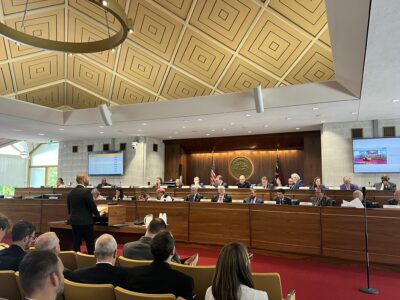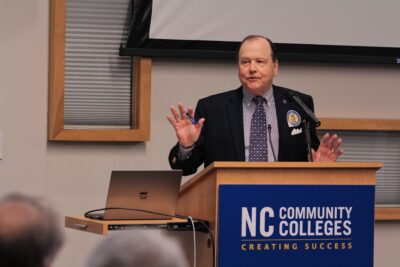

|
|
The Republican-led General Assembly passed North Carolina’s new $30 billion budget on Sept. 22, and the net appropriation for the North Carolina Community College System (NCCCS) is about $1.5 billion in both years of the spending plan.
The budget includes a 7% raise over two years for most state employees and community college personnel. Including these raises and other investments, the net appropriation adds a little more than $300 million in non-capital funding to the system over the biennium.
This is more than the system’s legislative ask for $232 million, which included a 7% raise for faculty and staff over the biennium. While the budget does not include the flexible student investment fund of $145.88 million the system requested, it does include an unprecedented amount of allocations to individual colleges for workforce and health care programs.
“We appreciate the significant investments made in this year’s budget, which will undoubtedly enhance our ability to empower students and bolster workforce development across North Carolina,” NCCCS President Dr. Jeff Cox said in a statement last week. “We are committed to building upon this investment by ensuring strategic and effective leadership for our 58-college system.”
The 625-page bill text for the compromise budget was finally made public on Sept. 20, nearly three months after the new fiscal year started. The first round of voting on the budget started less than 24 hours later.
The Republican-led House passed its budget in April, proposing 4.25% across-the-board salary increases in 2023-24 and 3.25% increases in 2024-25. The Republican-led Senate passed its budget in May, proposing a smaller pay raise of 5% over the biennium for most employees, or 7% for employees paid on an experience-based salary schedule.
Below, you can find an overview of the major community college items in the new budget, including pay raises, workforce and health care funds, and governance changes.
The money report for the budget is also available on the General Assembly’s website.
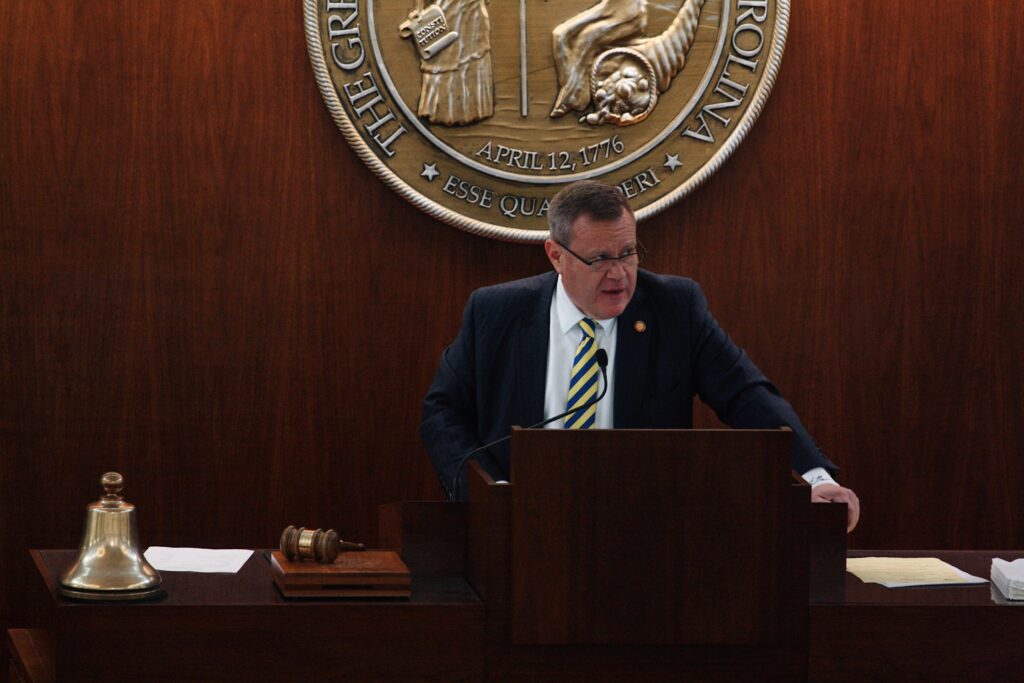

More on raises
As mentioned above, most community college employees will receive an across-the-board 4% raise in 2023-24 and a 3% raise in 2024-45. Employees paid on an experience-based schedule will receive a 5.5% raise in 2023-24 and a 3% raise in 2024-25. (These raises also apply to UNC System employees.)
Nursing faculty will receive extra raises on top of those across-the-board increases. Starting pay for nursing faculty will be increased by 10%, and other nursing faculty may receive salary increases up to 15%. Cox has previously said how difficult it is to hire nursing faculty when compared to industry pay.
Nursing faculty are usually highly qualified with master’s degrees. People who meet such criteria typically can make nearly $100,000 in the medical field, Cox said, which is much higher than most instructors are paid.
“We have the same issues related to many of our staff in terms of our need to be competitive in order to keep our staff employed at our colleges,” he told EdNC in January.
The budget also adds $19.4 million recurring in both years of the biennium to the community college faculty recruitment and retention fund, which is limited to faculty “with a majority teaching load in Tier IA or IB courses.”
There is also a one-time cost-of-living supplement to NCCCS retirees of 4% in 2023-24.
Finally, the budget is also expected to expand Medicaid to more than 600,000 North Carolinians, starting Dec. 1.
Funding for students, programs
The budget allocates $30.5 million recurring each year based on the change in college enrollment, “which increased by 6,404 full-time equivalent students, or 2.9%, compared to the amount budgeted for FY 2022-23.”
There is also $500,000 allocated each year to increase the formula budget allocation for each basic skills FTE student.
For students, the budget bill text creates a short-term workforce development grant program. Under that program, and “to the extent funds are made available for the Program, the State Board of Community Colleges shall award grants in an amount of up to seven hundred fifty dollars ($750.00) to students pursuing short-term, noncredit State and industry workforce credentials.”
“The eligible programs of study shall include programs such as architecture and construction, health sciences, information technology, electrical line worker, and manufacturing programs and may include other programs to meet local workforce needs,” the budget says.
The budget also allocates $12.5 million in recurring funds each year of the biennium for the Longleaf Commitment Community College Grant Program, which provides need-based financial aid to high school graduates who attend a North Carolina community college. The funds will support the high school class of 2023.


Gov. Roy Cooper launched the Longleaf Commitment in May 2021 to supplement the federal Pell grant and ensure recent North Carolina high school graduates from low- and middle-income families receive anywhere from $700 to $2,800 per year toward tuition and fees at the state’s 58 community colleges. The grant was funded using the Governors Emergency Education Relief (GEER) fund through federal COVID-19 relief packages. In November 2022, the grant was expanded in the state budget to also include 2022 high school graduates.
Last year, nearly $8.7 million in Longleaf funds went to more than 13,600 students, according to the governor’s press office. Of those students, 63% were from families with incomes less than $70,000 per year.
“It’s very impactful,” Longleaf recipient Renuka Khatri told EdNC last year. Khatri, who moved to Forsyth six years ago from Punjab, India, plans to transfer to a university after her second year at Forsyth Technical Community College and wants to work in health care — a field that is often expensive to pursue.
“A lot of students, when they go into the next semester, what they’re thinking about the most is how can we pay for it? How can my parents pay for it? The stress just lingers around your head, and it does impact your education,” she said. “But these years I’ve been at Forsyth Tech have been so worry free — I did not have to once think about money.”
The budget did not include a provision to provide in-state tuition for undocumented students, as advocated for by many education leaders.
Here are a few other items of note in the budget for community colleges:
- $15 million nonrecurring in 2024-25 for the NCCCS to upgrade its Enterprise Resource Planning (ERP) systems across the state. The system has been talking about these upgrades, which should improve data collection and sharing, for the last few years.
- $14.2 million nonrecurring to complete the project to improve broadband access “at all 47 rural colleges.”
- Revised multicampus center requirements: per the budget, a community college facility shall be considered a multicampus center if it as least four miles away from the main campus and other multicampus center locations, and “any other criteria established by the State Board.”
- $1 million nonrecurring to NCCCS for its marketing initiative “to increase awareness about community college course offerings and State financial aid opportunities.”
- Nearly $8 million over the biennium to “create a regional support network that supports training and job opportunities for students with intellectual disabilities across the State.” The system could also use funds to hire a part-time implementation coordinator, the budget says.
- $750,000 nonrecurring to “contract with the Division of Vocational Rehabilitation Services under the NC Department of Health and Human Services for a 3-year pilot program.” Through that program, vocational rehabilitation counselors would be placed in colleges “to assist students with intellectual and developmental disabilities with their career-related goals.”
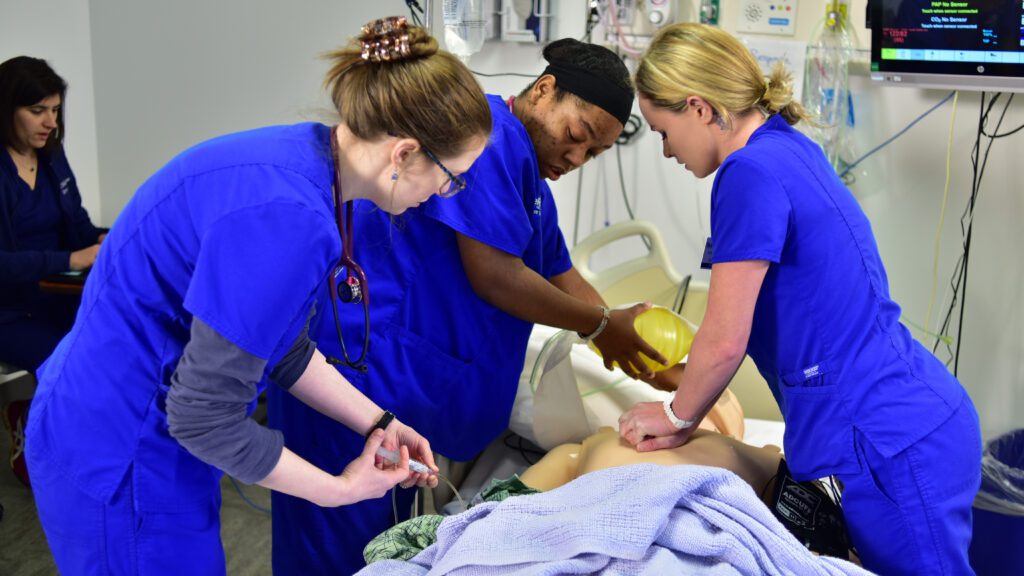

Health care funds
The new budget includes large investments in health care programs across the state. With shortages in nursing and other health-related fields, state leaders have said they hope community colleges can help address the pipeline gaps.
There’s $30 million over the biennium to help community colleges start nursing and health-related programs “that require significant start-up funds.”
“Colleges pay for a certain percentage of program costs based on the total enrollment of full-time equivalent students,” the budget says regarding those funds.
There is an additional $25 million over two years to develop and expand health care programs that lead to a degree or credential. The State Board of Community Colleges will allocate those funds.
The budget also allocates $7.9 million nonrecurring in 2023-24 and $10 million nonrecurring in 2024-25 to “establish a workforce training center that would provide no-cost training to public sector behavioral health providers, and to administer grants to community colleges to enhance behavioral health workforce training programs.”
The budget further allocates more than $275 million over the biennium for health care related programs at 14 different colleges.
- $60 million nonrecurring to Gaston College for capital improvements or equipment at a health science education and simulation center.
- $39 million nonrecurring to Caldwell Community College and Technical Institute to assist with construction costs related to a new health science building.
- $30 million nonrecurring to Isothermal Community College for a new health sciences building.
- $30 million nonrecurring to Cape Fear Community College for health program capital improvements.
- $25.25 million nonrecurring to McDowell Technical Community College for a new health sciences and public safety complex.
- $21 million nonrecurring to Robeson Community College for capital improvements to the health career center.
- $20 million nonrecurring to Pamlico Community College for the construction of an Allied Health center.
- $15 million nonrecurring to Roanoke-Chowan Community College for the construction of a new health sciences building.
- $15 million nonrecurring to Sampson Community College for allied health care capital improvements.
- $12.5 million nonrecurring to The College of the Albemarle for capital improvements or equipment for the nursing school.
- $3 million nonrecurring to Johnston Community College to expand the capacity of its nursing program.
- $2.5 million nonrecurring to Davidson-Davie Community College to support its health care programs.
- $2 million nonrecurring to Surry Community College to enter a memorandum of understanding with Northern Regional Hospital to employ up to eight licensed nursing educators to provide clinical instruction for the college.
- $1.5 million nonrecurring to Montgomery Community College for capital improvements related to its new dental hygienist program.
Individual allocations
The budget also includes $100 million nonrecurring in each year of the biennium for new construction and repairs of facilities at nearly two-thirds of the state’s community colleges. This marks an unprecedented number of individual allocations to community colleges, several NCCCS leaders have told EdNC.
Here are a few highlights from the allocations. You can view the full list at the bottom of this page.
- $30 million nonrecurring to Wilson Community College to support the construction of a workforce training center. The budget also includes $4.2 million nonrecurring to the college for capital improvements or equipment.
- $25 million nonrecurring to Sandhills Community College for a new vocation career path early college high school. At full capacity, the new early college will be able to serve 400 students.
- $25 million nonrecurring to Brunswick Community College for workforce development center and public safety center capital projects.
- $20 million nonrecurring to Coastal Carolina Community College to complete construction of a math and science building.
- $17 million nonrecurring to Wayne Community College for capital improvements or equipment.
- $10 million nonrecurring to Southwestern Community College for capital improvements, including a new business development center and library.
- $13 million nonrecurring to Stanly Community College for capital improvements or equipment. The budget also allocates $8.25 million nonrecurring to the college for a basic law enforcement training building and associated road improvements.
- $7 million nonrecurring to Cape Fear Community College for a new research vessel to replace the Cape Hatteras vessel, and $4 million nonrecurring for the Surf City campus expansion and related capital improvements or equipment.
- There is also $500,000 nonrecurring each year of the biennium to fund a partnership program between Cape Fear Community College (CFCC), New Hanover County Schools, and Pender County Schools “to meet the needs of certain underserved students in 7th through 9th grades through career and technical education programs at CFCC.” The funds will go toward programming costs and hiring career liaison positions.
- $3 million nonrecurring to Haywood Community College for job training programs that support the community following the closure of the Canton Mill. The budget includes an additional $3 million nonrecurring for renovations and improvements for a consolidated workforce and industrial training site.
- $650,000 nonrecurring to support Pamlico Community College’s prison education program.
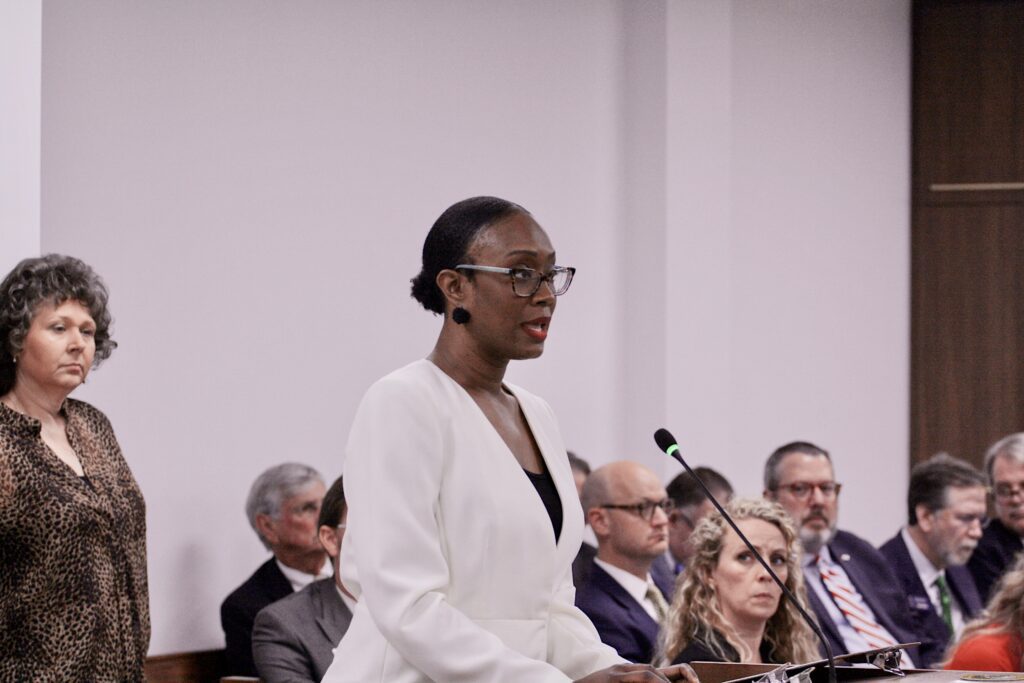

Governance changes
The budget includes several governance changes for both the State Board of Community Colleges and local boards of trustees.
In April, the Senate proposed a bill to overhaul community college governance, SB 692. The original bill would have given the system president and Republican-led General Assembly more power. The bill would have also reduced the authority of the State Board of Community Colleges and taken power away from the governor and local leaders.
After the State Board of Community Colleges named Cox as the 11th system president on April 21, momentum on the bill slowed, and sections which gave the system president more power were removed. Last week, the bill was gutted, and now contains various changes in education laws.
However, some of the changes to system governance ended up making it into the budget:
- The Board’s election of a system president is now subject to confirmation by the General Assembly. At least three final candidates should be submitted to the full Board, and the candidate who receives a majority of votes of the entire Board should be elected. The person elected by the Board will serve as interim-President until the General Assembly adopts a joint resolution confirming the selection.
- “If the General Assembly fails to adopt a joint resolution confirming the person by the date that either chamber reaches the thirtieth legislative day following the receipt of the name by the presiding officers, it shall be deemed that the General Assembly has denied confirmation. A person denied confirmation shall not serve as President or interim-President,” the budget reads.
- The Board will consist of 19 members, including the president of the North Carolina Comprehensive College Student Government Association (N4CSGA) as an ex officio member. The General Assembly will elect the other 18 members of the Board “at large to a term of four years beginning July 1 of an odd-numbered year and until a successor is elected and qualified.” Under the budget, the governor no longer has any appointments to the Board. Read more about the election process for Board members on page 74 and 75 of the budget bill.
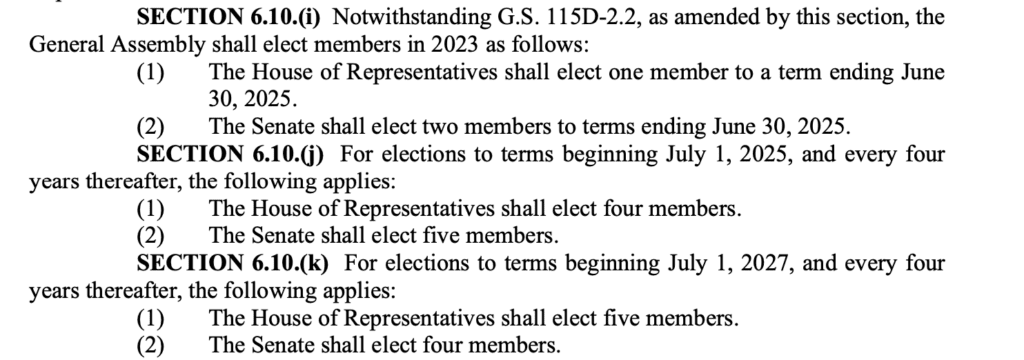

Each community college has a local board of trustees. The budget changed the selection process for these local boards. Eight trustees will be appointed by the General Assembly — two members annually. Four trustees will be elected by the board of commissioners of the county in which the main campus of the college is located. One of those four trustees can be a county commissioner.
In addition, each board of commissioners of any other county “in the administrative area that provides plant funds to the institution shall elect two additional trustees to the board,” the budget says, one of whom may also be a county commissioner. A board of commissioners can delegate the election of one or more of its trustees to a local school board of education if it so chooses.
The president of the college’s student government may also serve as an ex-officio nonvoting member, “if the board of trustees of the community college agrees.”
No member of the General Assembly can serve on a local board. You can read more about the laws regarding local boards starting at the bottom of page 75.
The budget bill text also lays out specific guidelines for the Vance-Granville Community College Board of Trustees on page 78.
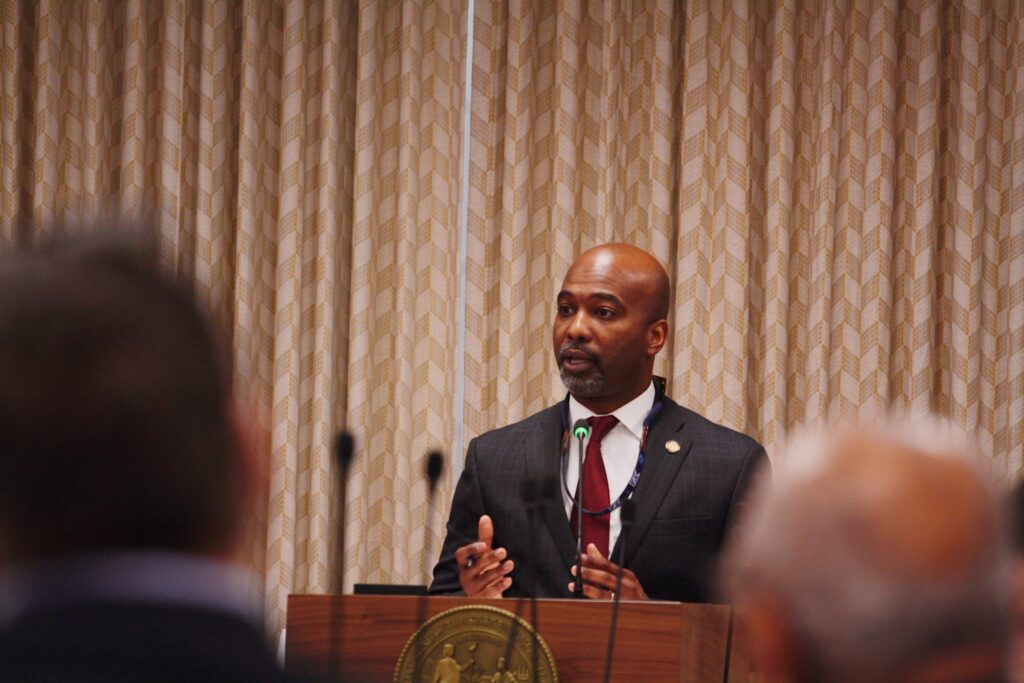

HBCUs
North Carolina’s bipartisan HBCU Caucus was formed at the beginning of this long session to advocate in the legislature for historically Black colleges and universities (HBCUs).
“We thank you for joining us as we embark on this extraordinary mission, but one that’s much needed, in forming an HBCU, historically Black colleges and universities, caucus,” caucus co-chair Sen. Gladys Robinson, D-Guilford, said in February. “It’s something we’ve been working on a very long time, some of us, but we are excited to have a collaborative effort this time.”
North Carolina has more four-year HBCUs than any other state in the nation and is home to the largest HBCU in the country. The NC10 includes five public colleges that are a part of the UNC System.
The budget allocates some new funding to the state’s five public HBCUs:
- $31.9 million in new funding to North Carolina A&T State University in 2023-24 and $27.8 million in 2024-25.
- $50,000 to North Carolina Central University in 2023-24 and $1.2 million in 2024-25.
- $1.2 million to Fayetteville State University, Winston-Salem State University, and Elizabeth City State University in 2024-25.
Last week, the Biden administration said that state leaders have shortchanged N.C. A&T a little under $2.1 billion over the past 30 years alone. N.C. A&T’s shortfall relative to N.C. State University is the second-largest disparity among the 16 states the U.S. Departments of Education and Agriculture targeted with letters issued Sept. 18th.
Senate Republicans highlighted this year’s budget investments in N.C. A&T among its top education items.
The budget includes $25 million over the biennium “to support NC A&T in its efforts to be recognized as a leading R1 research university as defined by the Carnegie Classification of Institutions of Higher Education.” The money will fund programs, research faculty and staff, research expenditures, and building infrastructure.
There is $21.4 million in new funds over the biennium for N.C. A&T’s Agriculture Research and Cooperative Extension programs, “which have a focus on small farmers and limited resource communities.” The revised appropriation is now $44.2 million. The budget also allocates $10 million over the biennium “for faculty, staff, equipment, facility improvements, and other resources needed to support an expansion of the College of Engineering.”
N.C. A&T also was allocated $2 million over the biennium to contract with SAS for an agricultural research platform.
At North Carolina Central, the budget allocates $50,000 to the UNC Board of Governors for storm damage repairs on the campus.
The budget also includes $1.2 million in anticipated receipts for each of the HBCUs in 2024-25, from “Sports Wagering/Horse Racing Wagering, to support the collegiate athletic department.”
The capital allocation also funds several renovations at the colleges.
- $36.4 million nonrecurring for continued funding for the College of Education at Fayetteville State University. The total amount authorized for the project is $63 million. There is also $2.5 million nonrecurring to the college “for a risk management school.”
- $970,000 nonrecurring the first year and $3.4 million nonrecurring in the second year for the second phase of the renovation of Marteena Hall at N.C. A&T. The total amount authorized for the project is $9.7 million.
- $30.9 million nonrecurring in 2024-25 for additional funding toward the construction of a new aviation instruction building at Elizabeth City State University. The total amount authorized for the project is $54 million.
- $4 million nonrecurring in 2023-24 for capital improvements or equipment at Winston-Salem State University’s campus police facilities. There is also $800,000 nonrecurring in 2024-25 “for comprehensive renovations and an addition at Eller Hall” on campus. The total amount authorized for this project is $10.8 million.
- $1.2 million nonrecurring the first year for the comprehensive renovation of the Dent Building at North Carolina Central. The total amount authorized for the project is $12.1 million
The budget also allocates $1 million in nonrecurring funds in 2023-24 to Bennett College for capital improvements or equipment. Bennett College is one of the state’s five private HBCUs.
Finally, there is $2 million in nonrecurring funds both years for the UNC Board of Governors to direct to several UNC System schools “to provide aid to students who are on track to graduate but at risk of dropping out because of financial shortfalls.” Those schools include the state’s five public HBCUs. The Senate proposal included $5.3 million both years for this purpose.
What did I leave out? What other questions do you have? Email me at hmcclellan@ednc.org.
List of individual allocations
Here is a list of all the nonrecurring allocations to individual community colleges included in the budget, other than those already listed above.
- $9 million to Guilford Technical Community College to support its partnership with the North Carolina Federation of Advanced Manufacturing Education (NC FAME).
- $5.5 million to Alamance Community College for capital improvements or equipment associated with a law enforcement training facility and indoor firing range. The budget also allocates $100,000 for student support grants, $750,000 for the Triad East Center for Advanced Technology (TECAT), and $500,000 for institutional and academic support services at the Dillingham Center campus.
- $11.35 million to Tri-County Community College “for multiple purposes, including the heavy equipment operator program.”
- $6 million for capital improvements/equipment at Carteret Community College.
- $17.025 million for capital improvements or equipment at Cleveland Community College.
- $3 million for capital improvements or equipment at Randolph Community College .
- $9 million for capital improvements or equipment at Rowan-Cabarrus Community College. There is also $5.5 million for parking and sewer infrastructure for the North Campus.
- $3 million to South Piedmont Community College for inflationary capital needs for the aseptic training facility.
- $1 million to Johnston Community College for capital improvements or equipment at the STEAM building. There is also $500,000 for a drainage project and related capital or equipment.
- $2.34 million to Blue Ridge Community College for capital improvements.
- $1.869 million to Central Carolina Community College for improvements to the firefighting training facility. There is also $10.854 million for capital improvements or equipment related to manufacturing education buildings at the college.
- $12 million to Craven Community College for capital improvements or equipment at the public safety training center.
- $1 million to Davidson-Davie Community College Foundation, Inc. for capital improvements, including construction of a regional training and distribution center.
- $4 million to James Sprunt Community College for a workforce development center and related capital improvements or equipment.
- $6.5 million to Mayland Community College to develop a YMCA in Spruce Pine, and $2 million to the Mayland Community College Foundation, Inc. for the Avery-Mitchell animal shelter.
- $1 million to Nash Community College for a workforce training center and related capital improvements.
- $1.75 million to Richmond Community College for the Hendrick Center for Automotive Excellence.
- $50,000 to Robeson Community College for technology upgrades and related equipment.
- $12.5 million to Southeastern Community College for capital improvements or equipment.
- $11.5 million to Vance-Granville Community College for an advanced manufacturing center and related equipment. There is also $3 million for capital improvements or equipment for the college’s transportation center.
- $10 million to Central Piedmont Community College for capital improvements or equipment for a fire safety training facility at the Merancas Campus in Huntersville.
- $750,000 to Edgecombe Community College for capital improvements or equipment.
- $5 million to Lenoir Community College for capital improvements or equipment, including an automotive systems technology, auto body and repair, and electric vehicle training facility.
- $5 million to Piedmont Community College for capital improvements or equipment for the advanced technology center.



